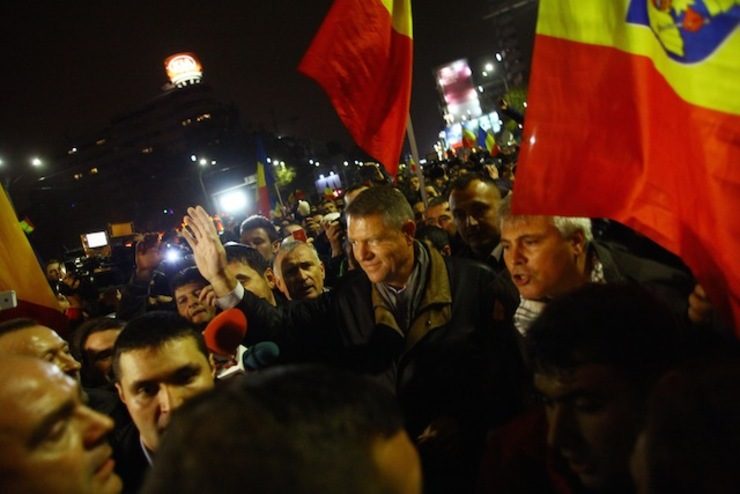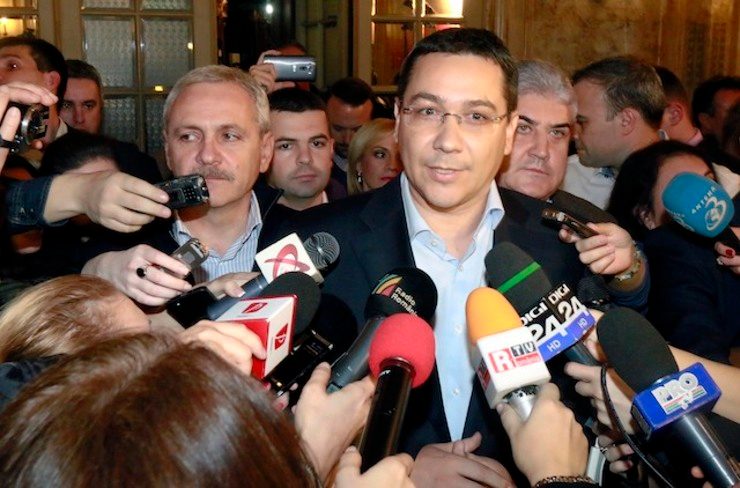SUMMARY
This is AI generated summarization, which may have errors. For context, always refer to the full article.

BUCHAREST, Romania – Romanian Prime Minister Victor Ponta on Sunday, November 16, conceded defeat in a presidential runoff he had been widely expected to win, with his conservative opponent Klaus Iohannis claiming a shock victory.
“I congratulated Mr Iohannis on his victory. The people are always right,” Ponta said after early exit polls put the two rivals neck-and-neck.
“We’ve won!” wrote Iohannis, the ethnic German center-right mayor of the medieval Transylvanian city of Sibiu, on his Facebook page.
The upset came after a record number of voters went to the polls, with officials putting the turnout at more than 62%.
With the official result not expected until Monday morning, three early exit polls put Iohannis narrowly in the lead, while two others favored Ponta. But pollsters said the difference between the two men had widened as more results came in.
The exit polls do not take into account the votes cast in the second-round runoff by Romanians abroad, seen as more likely to vote for Iohannis.
The election is seen as pivotal for one of the poorest countries in Europe which has struggled to combat an entrenched culture of corruption.
Ponta, 42, had hoped to become Romania’s youngest ever president and cement his Social Democrat party’s hold on power in the former communist state.
“I voted so that our parents can live in a better country and our children have a future here in Romania,” Ponta said earlier Sunday as he cast his vote, with his wife and two children in tow.
In the first round on November 2, Ponta took 40% of the vote against 30% for Iohannis.
But 46% of the ballots cast abroad were for Iohannis compared to just 16% for Ponta.
Experts had earlier said that a high turnout in the second round could well tilt the balance in Iohannis’s favor.
“The vote has been phenomenal. The turnout was huge,” Iohannis told supporters at his campaign headquarters after the seventh presidential election since the fall of dictator Nicolae Ceaucescu 25 years ago.
Iohannis, who as a member of Romania’s ethnic German minority has faced accusations he is a not a “real Romanian”, campaigned on an anti-corruption platform, vowing to turn Romania into a “normal” country.
Seen as a famously poor television performer who goes out of his way to avoid conflict, observers say he has appealed to voters with his reliability and honesty in a country sick of government corruption, with several senior figures in Ponta’s former communist Social Democrats accused of graft.
Rodica Avram, a 56-year-old teacher, said after casting her ballot in Bucharest that she had voted for change.
“For the past 25 years we have heard nothing but lies and promises that weren’t kept,” she said. “I hope we’ll finally have a president who respects people and does what he promises.”

Ponta’s main support base comes from the hugely influential Romanian Orthodox Church, as well as his party’s traditional electorate of the rural population, small business employees and the elderly and has been able to count on generally steady economic progress.
However, the economy fell into recession in the second quarter of 2014, although the government is forecasting 2.2% growth over the year.
Diaspora vote seen as key
Ahead of the vote experts said Romania’s diaspora, which numbers about three million, could play a key role in swinging the vote.
Only 160,000 were able to cast their ballots in the first round, due to an insufficient number of polling stations in countries including France, Germany and Britain.
On Sunday, long queues of people snaked outside polling stations in Paris, London and several other cities, according to pictures shown on Romanian television.
In the evening, thousands were still waiting to vote in some European cities, sparking renewed anger at the way the vote has been organized.
At the Romanian embassy in Paris police used tear gas to disperse hundreds of would-be voters who said they hadn’t been able to cast their ballot.
In Bucharest, several thousand people again took to the streets in solidarity with the expatriates they said were “prevented from voting”.
Despite progress in reforming the justice system – which has even seen a former minister jailed for corruption – many were fearful of a backlash if Ponta became president.
On what was dubbed “Black Tuesday” in December last year, Ponta’s government passed a series of new laws granting immunity to elected officials.
The changes were ultimately blocked but Ponta’s critics said the episode served as a wake-up call. – Rappler.com
Add a comment
How does this make you feel?
There are no comments yet. Add your comment to start the conversation.